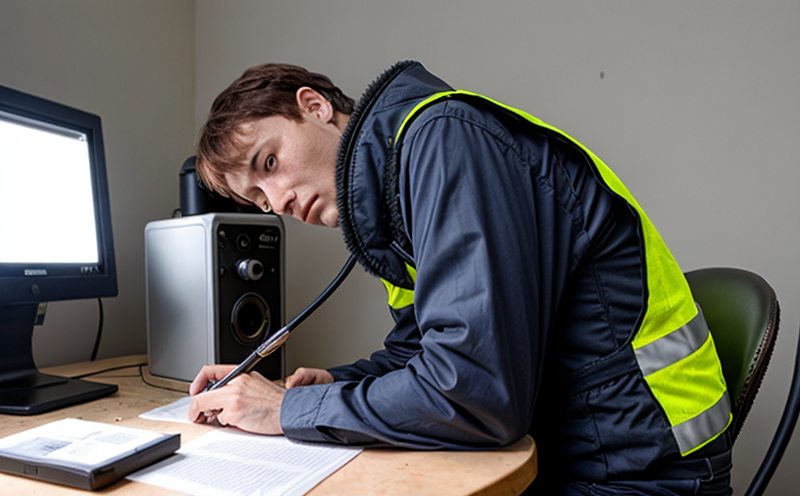ISO 17636 Radiographic Testing of Welds in Marine Applications
The ISO 17636 standard provides comprehensive guidelines for radiographic examination and evaluation of welds in marine applications. This service ensures that the integrity, safety, and reliability of critical components are maintained to meet international standards, which is essential in sectors such as maritime, offshore oil & gas, and shipbuilding.
Marine environments present unique challenges due to corrosion, stress-corrosion cracking, and fatigue, making it crucial to employ rigorous testing methods. Radiographic testing (RT) is a non-destructive examination technique that uses x-rays or gamma rays to inspect the internal structure of components. This method allows for the detection of flaws within welds, ensuring they meet stringent quality requirements.
For marine applications, the standard specifies parameters such as the type and strength of radiation used, exposure time, film processing conditions, and interpretation criteria. Compliance with ISO 17636 ensures that testing is performed consistently across different facilities, providing a reliable basis for decision-making in procurement and quality control.
The process begins with thorough preparation of the specimen to be examined. This includes cleaning, positioning, and ensuring it is free from obstructions that could interfere with the test results. The radiographic equipment must meet specified performance criteria to ensure accurate imaging. Once prepared, a series of exposures are taken at specific angles and distances, capturing detailed images of the internal structure.
The resulting films or digital images undergo meticulous analysis by certified personnel who interpret any indications present in the welds. Acceptance criteria based on ISO 17636 include the presence or absence of specified defects within allowable limits. Any discrepancies must be addressed according to a predefined corrective action plan, ensuring that only high-quality components are used.
Implementing this standard not only enhances product quality but also contributes to operational safety and regulatory compliance in the marine sector. By adhering to these stringent testing protocols, companies can demonstrate their commitment to excellence in manufacturing and maintenance practices.
Benefits
ISO 17636 radiographic testing offers numerous advantages for organizations operating within the marine industry:
- Enhanced Reliability: Ensures that critical components are free from defects, reducing the risk of failure during operation.
- Regulatory Compliance: Meets international standards and regulatory requirements, facilitating smoother operations in global markets.
- Increased Safety: Identifies potential hazards early on, preventing accidents and ensuring the safety of personnel and equipment.
- Cost Efficiency: By identifying defects before assembly or deployment, costly repairs can be avoided, saving time and resources.
- Improved Reputation: Demonstrates a commitment to quality, enhancing customer trust and satisfaction.
- Risk Management: Minimizes the risks associated with substandard components, protecting both assets and personnel.
In summary, ISO 17636 radiographic testing is an indispensable tool for maintaining high standards of quality in marine applications. It provides a robust framework for ensuring reliability, safety, and compliance across various sectors within this domain.
Eurolab Advantages
At Eurolab, we pride ourselves on providing unparalleled radiographic testing services tailored specifically to the demands of marine applications. Our expertise in this field is complemented by state-of-the-art equipment and a team of highly qualified professionals who are committed to delivering exceptional results.
- Advanced Equipment: Utilizing cutting-edge technology ensures accurate and reliable test results, even under challenging conditions.
- Certified Personnel: Our staff holds the necessary certifications from recognized bodies, guaranteeing their competence in performing ISO 17636 tests.
- Comprehensive Reporting: We provide detailed reports that offer clear insights into test outcomes and recommendations for action.
- Customized Solutions: Our services are designed to meet the unique requirements of our clients, ensuring that each project receives personalized attention.
- On-Time Delivery: We understand the importance of timely completion, which is why we strive to deliver results within specified deadlines.
- Cost-Effective Solutions: By streamlining processes and optimizing resources, we offer competitive pricing without compromising on quality.
Choose Eurolab for your ISO 17636 radiographic testing needs. Our commitment to excellence sets us apart in the industry, ensuring that you receive top-tier service every time.
Quality and Reliability Assurance
The importance of quality assurance (QA) and reliability assurance in marine applications cannot be overstated. ISO 17636 radiographic testing plays a pivotal role in ensuring that all components meet the highest standards, thereby enhancing overall performance and longevity.
Achieving compliance with this standard involves several key steps:
- Initial Assessment: Conducting an initial evaluation of the component to be tested, including its design, materials, and manufacturing processes.
- Preparation: Ensuring that the specimen is properly prepared for testing, which includes cleaning, positioning, and ensuring it is free from obstructions.
- Exposure: Taking a series of exposures at specified angles and distances to capture detailed images of the internal structure.
- Analysis: Carefully examining the resulting films or digital images by certified personnel who interpret any indications present in the welds.
The acceptance criteria based on ISO 17636 include the presence or absence of specified defects within allowable limits. Any discrepancies must be addressed according to a predefined corrective action plan, ensuring that only high-quality components are used. This approach not only enhances product quality but also contributes significantly to operational safety and regulatory compliance.
In addition to these technical aspects, Eurolab ensures that every aspect of the testing process adheres strictly to international standards. By doing so, we provide clients with peace of mind knowing that their critical components have been rigorously examined and approved according to best practices.





